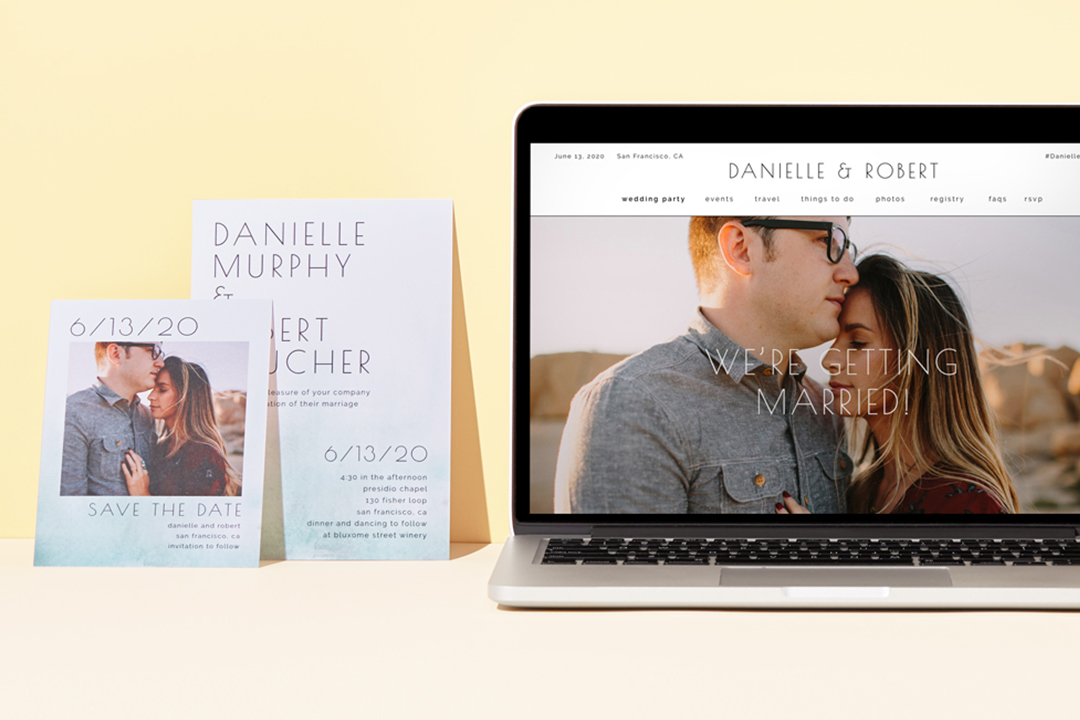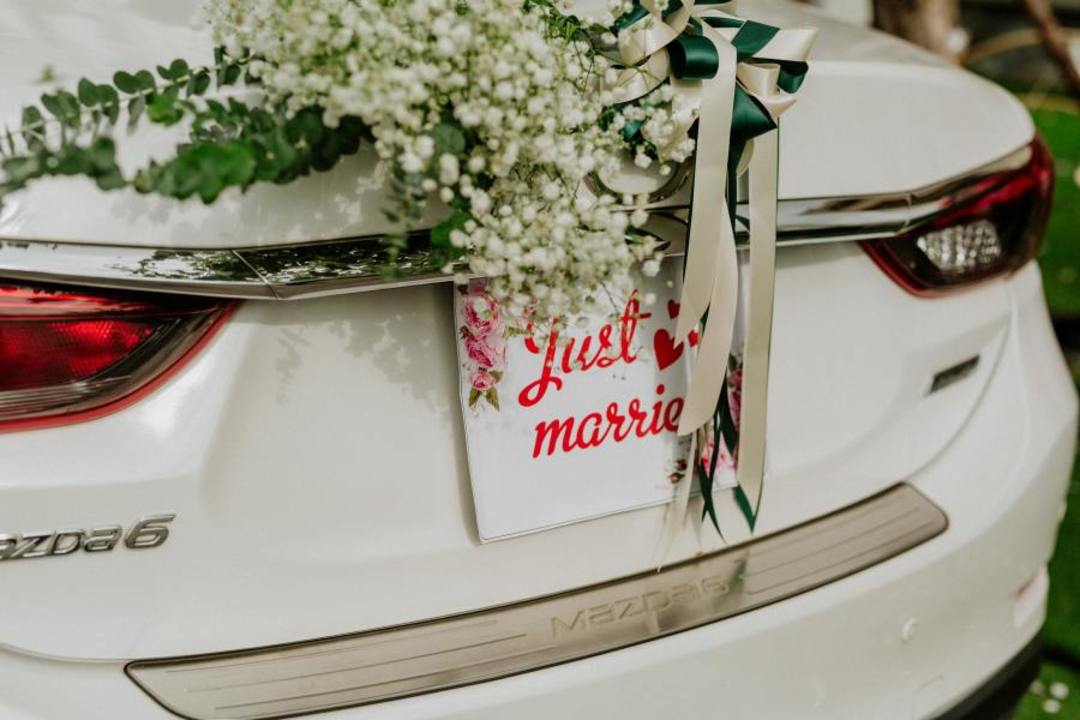- Expert advice/
- Wedding planning 101/
- Wedding websites/
- 11 Dos and Don'ts for Your Wedding Website
- Wedding websites
11 Dos and Don'ts for Your Wedding Website
Your wedding website provides your wedding guests with all the necessary info about your wedding. Here's exactly what to include and what to skip on your wedding website.
Last updated February 5, 2024

The First Look ✨
- Your wedding website’s main purpose is to provide your guest with information about your wedding day, so include wedding date, location, and travel accommodation.
- On your wedding website site, do: Password protect, share lodging recommendations, link your registry, and allow guest RSVPs.
- On your wedding website site, do not: List exclusive events, be long-winded, or use language your guests may not understand.
Your wedding website is paramount when it comes to getting information out to your loved ones about your big day. Whether it’s the details for the day of or some background on the wedding party, it’s a central hub for everyone you invite. Even though it’s not technically part of a traditional invitation suite, we like to think of it as a necessary component. Plus, with Zola, your wedding website is free—and you can seamlessly integrate your wedding gift registry into it. So why not make one? Your friends, family, and other wedding guests will thank you. But with all that information to share, you want to make sure you do it right. Our wedding website FAQ page has some important questions for you to answer on your site about your special day.
1. What Is a Wedding Website?
A wedding website is a website created and shared by an engaged couple. Its primary purpose is to act as a touchpoint for your guests to access information about your wedding day or weekend. Typically, your website will include details such as your wedding date, location, and travel accommodations. Usually, couples will also add information about how they met and introduce their wedding party via their site.
2. What Should We Include On Our Wedding Website?
When writing for your wedding website, remember that your guests aren’t familiar with all of the details about your wedding day. The following FAQ section answers some frequently asked questions that can help you design and write a website to help the loved ones on your wedding guest list celebrate your big day without stressing out about the details.
Do: Use Password Protection
Don’t worry about publishing your wedding details online for everyone to see. With Zola, you can password-protect your wedding website. This way only your wedding guests can access it via a code, which you can conveniently share on your save the dates and wedding invitations.
Of course, you don’t have to password-protect your site, but doing so secures your personal information and eliminates the possibility of wedding crashers.

Do: Provide All Necessary Information
The point of your wedding website is to deliver all the necessary wedding need-to-knows to your guests. Think of it this way: Consider all the things your guests may text you to ask about and then add that information to your site. You should include the basics: your wedding day, wedding venue information, wedding reception location/reception venue information, travel and lodging logistics, directions, and points of contact. Then, add in more: a weekend itinerary, links to your registry, your couple story, and wedding party introductions.
If you’re having a wedding with a set dress code (beyond standard seasonal wedding attire), be sure to add that to your site, too. We recommend including details of expected weather around your wedding date, too, if possible. Also, let guests know if there are any other outdoor wedding conditions to prepare for. This may include suggesting a shawl for cooler nights or certain footwear if your wedding ceremony or reception is taking place on sandy or grassy terrain.
You may also want to reiterate details about your wedding ceremony start time, reception end time, if there will be a cocktail hour or open bar, and if there will be an after-party. If necessary, remember to provide location information and directions to these events.
Do: Share Lodging And Food Recommendations
Whether you have out-of-town guests or are planning a destination wedding, lodging and dining recommendations are always a welcome addition. When recommending accommodations, your website should make it clear which ones in the area you reserved hotel room blocks with—and provide all relevant information (directions, address, etc.). Feel free to also offer suggestions for other lodging accommodations in the area, too. Additionally, share some recommendations for popular local attractions, restaurants, and any other fun activities.
Do: Outline Any Social Media Restrictions
Want everyone posting up a storm during your ceremony? Prefer an entirely unplugged wedding? Social media can be a great tool for hyping up your special day, but it’s also not for everyone, so let your guests know your preferences upfront. Use some space on your wedding website to describe your phone usage guidelines—and be specific. If you’re totally fine with phones out at the reception, but don’t want any being used during your wedding ceremony, write that out. Likewise, if you’ve created a wedding hashtag that you want people to use, list it. Pro tip: Make your wedding website URL and hashtag the same.
Do: Attach Or Link To Your Registry
Adding your wedding registry to your website is a no-brainer—it's convenient for both you and your guests. Don’t make guests visit a bunch of different webpages. Instead, consolidate. To easily attach your Zola registry to your wedding website, look for the “Add Existing Registry” option when you’re creating your site. Don’t worry: If you don’t have an existing registry yet, you can always add it to the site once you do. And, yes, your website can (and should) also link to your honeymoon fund or other Zola cash registry.
You can also note your wedding registry on your RSVP response card. This is particularly valuable real estate if you’d prefer that your wedding guests RSVP via your website and not with the physical response card.
Do: Let Guests RSVP Via Your Site
Online RSVPs are a modern addition to wedding websites that can be a lifesaver—for you and those on your wedding guest list. This makes it easy for guests to let you know if they can make it or not as soon as they can and lets them know if they can bring a plus one. When a guest RSVPs via your Zola wedding website, that information is stored in your guest list so you can easily track RSVPs during your wedding planning, making it easier to create your wedding seating chart.
Plus, then you’re not waiting weeks for a response or worrying about lost mail. Let guests know they can digitally RSVP on your invitation or an enclosure card. Use wording along the lines of, “Kindly RSVP by [RSVP deadline] by mail or at [URL].”
Your online RSVP should include information about the type of food that will be served. Also, make sure to ask for any dietary restrictions so that everyone on your wedding guest list can enjoy a delicious meal.
3. What Should We Avoid On Our Wedding Website?
Your wedding website is your own and should invite your loved ones to share in the celebration of your pending nuptials. Still, the following FAQ section outlines some practices to avoid to make sure everyone feels welcome and can find the information they need to join you on your big day.
Don't: Using Your Wedding Website as the Only Way to RSVP
Online RSVPs are convenient, but they shouldn’t be the only way for guests to respond. Don’t skip paper response cards altogether. After all, not everyone is tech-savvy, and others simply prefer a traditional RSVP. Send out RSVP cards with your wedding invitations to give everyone the option to respond in their preferred way.
Don't: Listing Events That Aren’t Open to All Guests
Your wedding planning might include some exclusive events leading up to or after the wedding. We’re referring to those that only involve family and the wedding party, like your rehearsal dinner and bachelor or bachelorette party. These events should be left off of your wedding website. Instead, this information should be communicated directly to those involved. Having it on your website may lead to confusion and unexpected arrivals. Although, if you’ve planned other wedding events that are open to all guests, like a day-after brunch, cocktail hour, or after-party, provide that information and include it in your itinerary.
Don't: Including Inappropriate Language, References, and Suggestions
One of the many pros of a wedding website is that you get to write it yourself as a couple. Many people choose to include their couple story on a charming and creative "about us" page, as well as bios about their wedding party members. If you do this, be mindful of the information you share and consider which details can—and should—be left out. If a story is embarrassing or inappropriate, leave it out. This isn’t the place for inside jokes or details someone may consider too personal.
Don't: Wordiness
With that in mind, don’t feel pressured to fill pages with relationship backstory. Your website is meant to be a fun and efficient means of gathering information, not an autobiography. Focus mainly on including necessary information—keep everything else short and sweet.
Don't: Confusing Language and Abbreviations
Avoid using abbreviations, acronyms, and other language that all guests might not understand. For example, write out maid of honor and skip the MOH abbreviation. Similarly, avoid any nicknames or shortened location names when providing critical directions or addresses. Be as clear, concise, and direct as possible.
Zola, The Best Wedding Website
Overall, your website should be informative and fun. Zola simplifies your wedding planning by helping you build a fully customizable wedding website using designer templates personalized to your tastes and preferences—no tech experience necessary. Use our powerful and stress-free tools to create a stunning wedding website and wedding registry with Zola—and then enjoy your special day!
Up next for you

How to Build a Wedding Website: Guide + Tips
Inspiration
Create a beautiful, shareable free wedding website that will keep all your information in one place and make you and your SO's life easier.

What to Put in Your Wedding Welcome Bags: Tips & Ideas
Inspiration
Greet your guests with thoughtfully curated wedding welcome bags. Find perfect favors & essentials to delight your guests as they join your celebration.

How to Book Hotel Rooms for Your Wedding Guests
How-To
Check out our comprehensive guide on how to book hotel rooms for your wedding guests to learn the ins and outs of this sometimes-tricky task.

How to Include Your Wedding Website on Your Invitation
How-To
Wondering how to share your wedding website with guests? Explore etiquette tips for how to share your wedding website on an invitation.
Featured

10 Things You Should Do as a Newlywed
List
From financial planning and taxes to insurance and legal documents, follow this 10-step list to help you get your newlywed life up and running smoothly in no time.

Essentials to Put on Your Wedding Registry
Inspiration
Get started building your registry with our a super-comprehensive checklist of list registry essentials, straight from our team of experts, that will cover ALL of your needs and help you build the newlywed home of your dreams.

Wedding Registry Checklist
Inspiration
Haven’t made a registry yet? Have no fear—Zola’s 2023 wedding registry checklist is full of the top registry items, helpful word choices, and etiquette tips!
- Expert advice/
- Wedding planning 101/
- Wedding websites/
- 11 Dos and Don'ts for Your Wedding Website
Find even more wedding ideas, inspo, tips, and tricks
We’ve got wedding planning advice on everything from save the dates to wedding cakes.
